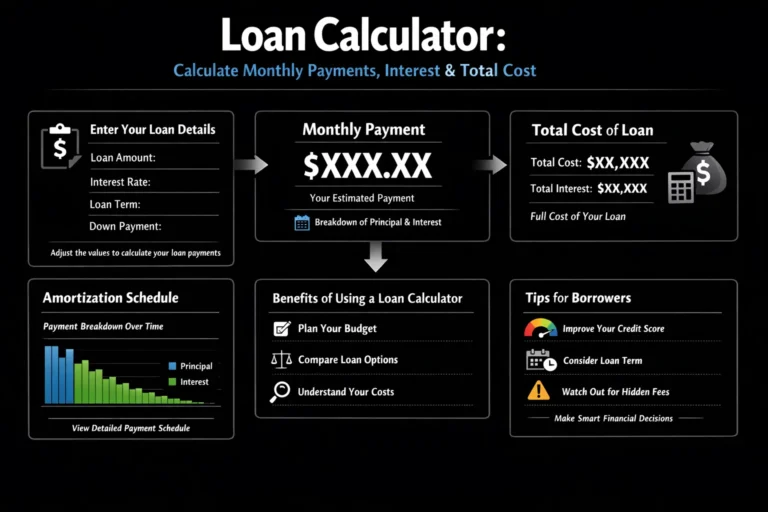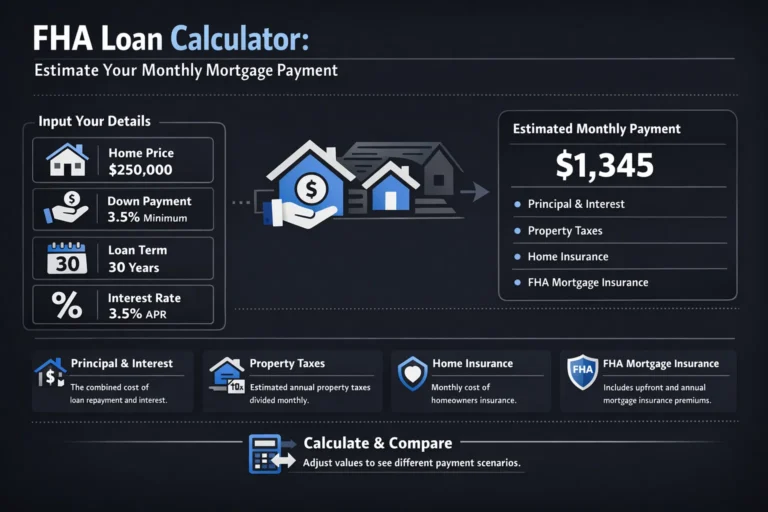
Mortgage Calculator - Calculate Your Monthly Payments & Amortization
Mortgage Calculator
Fill in the details below to calculate your monthly mortgage payments
Your Mortgage Results
Monthly Payment Breakdown
Loan Overview
How to Use This Calculator
Step-by-Step Instructions
- Select Your Currency: Choose from USD, GBP, CAD, or AUD to match your local currency
- Enter Home Price: Input the total purchase price of the property
- Set Down Payment: Enter either the dollar amount or use the slider for percentage
- Adjust Loan Term: Select your preferred mortgage duration (5-30 years)
- Set Interest Rate: Adjust based on current market rates or your pre-approval
- Include Additional Costs: Add property tax, insurance, and PMI if applicable
- Calculate: Click the calculate button to see your results
Understanding the Inputs
- Home Price: The total cost of the property you’re purchasing
- Down Payment: Initial payment that reduces your loan amount (aim for 20% to avoid PMI)
- Loan Term: Duration of your mortgage (longer terms = lower payments but more interest)
- Interest Rate: Annual percentage rate charged by the lender
- Property Tax: Annual tax based on property value (varies by location)
- Home Insurance: Annual premium to protect your property
- PMI: Private Mortgage Insurance required if down payment < 20%
Interpreting the Results
- Monthly Payment: Total amount due each month
- Principal & Interest: Core mortgage payment
- Additional Costs: Property tax, insurance, and PMI breakdown
- Total Interest: Amount paid in interest over the loan term
- Pay-off Date: When your mortgage will be fully paid
How Mortgage Payments Are Calculated
The Mortgage Formula
The standard formula for calculating monthly mortgage payments is:
M = P [ i(1 + i)^n ] / [ (1 + i)^n – 1 ]
Where:
- M = Monthly mortgage payment
- P = Principal loan amount (home price minus down payment)
- i = Monthly interest rate (annual rate ÷ 12)
- n = Total number of payments (loan term in years × 12)
Example Calculation
For a $300,000 home with 20% down payment ($60,000), 4.5% interest rate, and 30-year term:
- Principal (P) = $300,000 – $60,000 = $240,000
- Monthly interest rate (i) = 4.5% ÷ 12 = 0.375% = 0.00375
- Number of payments (n) = 30 × 12 = 360
M = 240,000 [ 0.00375(1 + 0.00375)^360 ] / [ (1 + 0.00375)^360 – 1 ]
M = 240,000 [ 0.00375(3.8477) ] / [ 3.8477 – 1 ]
M = 240,000 [ 0.014429 ] / [ 2.8477 ]
M = 240,000 × 0.005067
M = $1,216.08 (principal and interest)
Additional monthly costs:
- Property Tax: $3,000 ÷ 12 = $250
- Home Insurance: $1,200 ÷ 12 = $100
- PMI: $240,000 × 0.5% ÷ 12 = $100
Total Monthly Payment = $1,216.08 + $250 + $100 + $100 = $1,666.08
How to Apply These Results to Your Financial Strategy
Actionable Advice Based on Your Results
If your payment is too high:
- Increase your down payment to reduce the loan amount
- Consider a longer loan term (30-year vs. 15-year)
- Shop around for better interest rates
- Look for less expensive properties
To save on interest:
- Make extra principal payments when possible
- Consider bi-weekly payments instead of monthly
- Refinance when rates drop significantly
- Choose a shorter loan term if affordable
Common Mistakes to Avoid
- Underestimating total costs: Remember property taxes, insurance, and maintenance
- Stretching your budget: Keep housing costs below 28% of gross income
- Ignoring PMI: Factor in this cost if putting down less than 20%
- Forgetting about closing costs: Typically 2-5% of home price
Advanced Calculation Scenarios
Comparing Mortgage Options
15-year vs. 30-year Mortgage:
- 15-year: Higher payments but significantly less interest
- 30-year: Lower payments but more interest over time
Fixed vs. Adjustable Rate:
- Fixed: Payments stay the same for entire term
- ARM: Lower initial rate but can increase over time
Impact of Extra Payments
Making even small additional payments can dramatically reduce your loan term and total interest:
- Extra $100/month on a $240,000 loan: Pay off 4+ years early, save $40,000+ in interest
- One extra payment per year: Reduce 30-year term to about 25 years
Refinancing Analysis
Calculate when refinancing makes sense by comparing:
- Current remaining balance and interest rate
- New loan terms and interest rate
- Closing costs for the new loan
- Break-even point (when savings exceed costs)
Important Considerations
What This Calculator Doesn’t Account For
- Closing costs: Typically 2-5% of home price
- Home maintenance: 1-2% of home value annually
- HOA fees: If applicable to your property
- Utility costs: Electricity, water, gas, etc.
- Future tax or insurance increases
Assumptions Made
- Interest rate remains constant (for fixed-rate mortgages)
- Property tax and insurance costs remain stable
- No additional principal payments are made
- PMI is removed once 20% equity is reached
When to Consult a Professional
- If you have complex financial situations
- When considering adjustable-rate mortgages
- For tax implications specific to your location
- If you’re self-employed or have variable income
Frequently Asked Questions
How much house can I afford?
+Most financial experts recommend keeping your total housing costs below 28% of your gross monthly income. This includes principal, interest, taxes, and insurance (PITI).
What’s the difference between pre-qualification and pre-approval?
+Pre-qualification is a preliminary assessment based on information you provide, while pre-approval involves verification of your financial information and is a stronger indication of borrowing power.
Should I pay PMI or put down 20%?
+If possible, putting down 20% avoids PMI costs. However, if home prices are rising quickly, it might be better to buy sooner with a smaller down payment and refinance later to remove PMI.
How does my credit score affect my mortgage rate?
+Higher credit scores typically qualify for lower interest rates. A difference of 0.5% in rate can save tens of thousands over the life of a loan.
Are there benefits to a 15-year mortgage vs. 30-year?
+A 15-year mortgage has higher monthly payments but much less interest paid over time. It also builds equity faster and is typically offered at a slightly lower interest rate.
Other Financial Calculators You Might Find Useful
- Mortgage Affordability Calculator: Determine how much house you can realistically afford based on your income and expenses
- Loan Amortization Calculator: See exactly how each payment is split between principal and interest over the life of your loan
- Refinance Calculator: Calculate whether refinancing your current mortgage makes financial sense
- Rent vs. Buy Calculator: Compare the costs of renting versus buying a home in your area
- Debt-to-Income Ratio Calculator: Understand how lenders view your overall debt burden
Regulatory Considerations
United States
- Mortgage regulations governed by CFPB (Consumer Financial Protection Bureau)
- TRID rules require specific disclosures about loan terms and costs
- State-specific regulations may apply to mortgage lending
United Kingdom
- FCA (Financial Conduct Authority) regulates mortgage lending
- Mortgage Market Review introduced stricter affordability checks
- Help-to-Buy schemes available for first-time buyers
Canada
- OSFI (Office of the Superintendent of Financial Institutions) sets lending guidelines
- Stress test requirements ensure borrowers can handle higher rates
- CMHC provides mortgage loan insurance
Australia
- APRA (Australian Prudential Regulation Authority) oversees lending standards
- Responsible lending obligations require assessment of borrower circumstances
- First Home Owner Grants available in some states
Case Studies
Case Study 1: First-Time Homebuyer
Sarah, 32, used our calculator to determine she could afford a $350,000 home with a 10% down payment. By adjusting the loan term from 30 to 25 years, she saved $45,000 in interest while keeping payments manageable.
Case Study 2: Refinancing Decision
The Johnson family had a $280,000 mortgage at 5.2% interest. Our calculator showed that refinancing to 3.8% would save them $200/month and $42,000 over the loan term, even after accounting for closing costs.
Glossary of Terms
- Amortization: The process of paying off a debt over time through regular payments
- APR (Annual Percentage Rate): The total cost of borrowing, expressed as a yearly rate
- Equity: The difference between your home’s value and your mortgage balance
- Escrow: An account held by the lender to pay property taxes and insurance
- LTV (Loan-to-Value Ratio): The mortgage amount divided by the home’s value
- PMI (Private Mortgage Insurance): Insurance that protects the lender if you default on your loan





